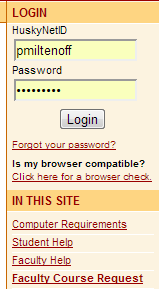D2L Production Upgrade from Version 10.0 to Version 10.1 is May 31-June 1, 2013
The D2L upgrade to version 10.1 is scheduled for Friday-Saturday, May 31 to June 1 2013. More on information on exact times the system will be unavailable will be forthcoming. The new D2L version is currently available to at https://stcloudstateqa.ims.mnscu.edu/
Version 10.1 Training and Support
There are some changes to the D2L interface due to the upgrade, most notably in the content area. A number of training videos highlighting these changes are available for both faculty and students at: http://mnscuims.mnscu.edu/training.html. Workshops for faculty will be offered both this summer and again during fall convocation and fall semester. Summer workshop dates will be announced shortly.
Please share your suggestions and ideas for training and workshops, as well as questions or concerns, please contact d2l@stcloudstate.edu.
For more information, please follow us
Twitter: @scsuinstruc #d2l
And
Blog.stcloudstate.edu/ims
Question: What does the “Auto-Submit” quiz submission type mean?
Answer: This is a confusing quiz submission type because its name is misleading.
Go to FAQ https://d2l.custhelp.com/app/answers/detail/a_id/1301 for details on “Auto-Submit” quiz submission.
Below is informative exchange on how to subtitle course capture (screencast):
Are we talking Camtasia Studio or Relay?
Relay no longer publishes to Flash – it was replaced with MP4 and a “Smart Player” – and the subtitling is stored in an XML file that is dynamically read by the Smart Player.
I can confirm that Studio burns the captions into an MP4, as Steve points out.
-Jeremy
Jeremy Anderson
Instructional Technologist
203.582.3792 | jjanderson@quinnipiac.edu
From: The EDUCAUSE Blended and Online Learning Constituent Group Listserv [mailto:BLEND-ONLINE@LISTSERV.EDUCAUSE.EDU] On Behalf Of Covello, Steve
Sent: Friday, May 10, 2013 2:52 PM
To: BLEND-ONLINE@LISTSERV.EDUCAUSE.EDU
Subject: Re: [BLEND-ONLINE] Subtitling Screencasts
Camtasia captioning is burn-in, as far as I know (at least in Mac 2). So I don’t think Flash is an aspect of it unless that is the format you are exporting it as.
– Steve
—
Steve Covello
Rich Media Specialist/Online Instructor
Granite State College
603-513-1346
Skype: steve.granitestate
Scheduling: http://meetme.so/stevecovello
From: Frank Lowney <frank.lowney@GCSU.EDU>
Reply-To: The EDUCAUSE Blended and Online Learning Constituent Group Listserv <BLEND-ONLINE@LISTSERV.EDUCAUSE.EDU>
Date: Friday, May 10, 2013 2:42 PM
To: “BLEND-ONLINE@LISTSERV.EDUCAUSE.EDU” <BLEND-ONLINE@LISTSERV.EDUCAUSE.EDU>
Subject: Re: [BLEND-ONLINE] Subtitling Screencasts
Both ScreenFlow (Mac-only) and Camtasia (Mac/Win) support subtitling. Both are excellent screencast applications but I prefer ScreenFlow because it creates MPEG-4 files whereas Camtasia requires Flash for subtitles and that pretty much rules out mobile.
If these screencastsare made with some other, less expensive apps, I suggest using free, open source apps. There are many but I prefer Jubler for creating subtitles and Subler for installing them in MPEG-4 files. These are Mac apps.
I’ve recently come across CapScribe which is free to education and plan to look it over carefully. It looks very promising: http://www.inclusivemedia.ca/services/capscribe.shtml This is also Mac-only.
On May 10, 2013, at 12:00 AM, BLEND-ONLINE automatic digest system <LISTSERV@LISTSERV.EDUCAUSE.EDU> wrote:
Hello!
In creating accessible online and blended courses, one of the challenges we
are dealing with is making sure faculty created videos (narrated
PowerPoints, screencasts, etc.) are accessible. I would love to hear how
others are handling this. Do you recommend/require that these videos be
closed captioned? If so, who is responsible for creating the closed
captions? Do you have staff on campus that do this or is it the faculty
member’s responsibility? Or do you use a service? Can you recommend any
software that helps someone easily create closed captions or a service that
can provide this?
Thank you so much,
Andrea
—
Andrea Milligan
Director of Instructional Technology and Design
North Shore Community College
1 Ferncroft Road
Danvers, MA 01923
978-739-5425
==================================================================
Dr. Frank Lowney Georgia College & State University
Projects Coordinator, Digital Innovation Group @ Georgia College
Chappell Hall 212 (CBX 106)
Web Site, Blog, GCSU Email, iCloud Email
My latest book: The Coming ePublishing Revolution in Higher Education
Voice: (478) 445-1344
NOTICE: Please be advised that I am hearing impaired and communicate most effectively via e-mail. Follow-up summaries of telephone conversations by e-mail are most appreciated.
********* takes 3-5 business days to complete the process! *******************
******************Request your courses EARLY (at least month before classes start)********************
D2L Course request is available on the following Web page:
https://www5.stcloudstate.edu/FS/FS/Login.aspx?ReturnUrl=%2fFS%2fD2L%2fRequests.aspx
The link is displayed under the D2L login on the Huskynet Window:
 https://www5.stcloudstate.edu/FS/FS/Login.aspx?ReturnUrl=%2fFS%2fD2L%2fRequests.aspx%5B/caption%5D
https://www5.stcloudstate.edu/FS/FS/Login.aspx?ReturnUrl=%2fFS%2fD2L%2fRequests.aspx%5B/caption%5D
http://blogs.kqed.org/mindshift/2013/05/parents-want-kids-to-use-mobile-devices-in-schools/?utm_source=feedburner&utm_medium=email&utm_campaign=Feed%3A+kqed%2FnHAK+%28MindShift%29
Grunwald Associates and the Learning First Alliance with support from AT&T, found that, according to data from a representative nationwide sample of nearly 2,400 parents, more than four in five K-12 students at least occasionally use some sort of computing device, including mobile devices like tablets or smartphones, or laptop computers.
related:
Should Schools Subsidize Mobile Phones for Kids?
http://blogs.kqed.org/mindshift/2011/04/should-schools-subsidize-mobile-phones-for-kids/
Cell Phones in Schools Get Thumbs Up By the Department of Ed
Login into D2L
click on your D2L course
In the Navigation Bar, go to “Edit Course”
Locate “Course Offering Information” and click on it.
Change the dates when your course can start and end. You can also activate and deactivate your course
From: Jorgensen, Gregory S.
Sent: Tuesday, May 07, 2013 10:07 AM
To: Miltenoff, Plamen
Subject: RE: Voice Mail from Galler, Robert W. (33 seconds)
When downloading some D2L Content (usually Microsoft Office documents) with Internet Explorer, the security settings don’t allow the document to be edited properly.
The solution is to use a different browser, such as FireFox, Safari or Chrome, *OR*, choose ‘Save’ (rather than ‘Open’) and save the file. When it’s opened, the ‘enable editing’ feature will work properly.
http://www.defectivebydesign.org/dayagainstdrm
what is DRM:
Digital rights management
http://en.wikipedia.org/wiki/Digital_rights_management
Companies such as Amazon,AT&T, AOL, Apple Inc., Google[1], BBC, Microsoft, Electronic Arts, and Sony use digital rights management.
Those opposed to DRM contend there is no evidence that DRM helps prevent copyright infringement, arguing instead that it serves only to inconvenience legitimate customers, and that DRM helps big business stifle innovation and competition.[6] Furthermore, works can become permanently inaccessible if the DRM scheme changes or if the service is discontinued.
Dr. Miltenoff and Dr. Schnellert presented at MADLAT (http://madlat.ca/) their cross-cultural comparison and research on the use of social media in education:
http://web.stcloudstate.edu/pmiltenoff/conf2013/madlat/Schnellert_Miltenoff_educational_use_of_social_media.pptx
Please enter your thoughts and ideas about the use of social media sites in education

 https://www5.stcloudstate.edu/FS/FS/Login.aspx?ReturnUrl=%2fFS%2fD2L%2fRequests.aspx%5B/caption%5D
https://www5.stcloudstate.edu/FS/FS/Login.aspx?ReturnUrl=%2fFS%2fD2L%2fRequests.aspx%5B/caption%5D